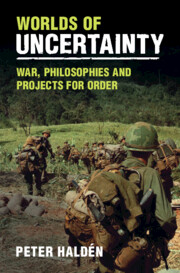Book contents
- Worlds of Uncertainty
- Worlds of Uncertainty
- Copyright page
- Contents
- Acknowledgements
- 1 Introduction
- 2 Divine Providence, History and Fortuna
- 3 Accommodations of Uncertainty (1650–1790)
- 4 The Future as Promise, Problem and Project (1790–1913)
- 5 Hubris and Trepidation (1914–1989)
- 6 Conjuring Uncertainty (1989–2022)
- 7 Conclusions
- Bibliography
- Index
5 - Hubris and Trepidation (1914–1989)
Published online by Cambridge University Press: 21 December 2023
- Worlds of Uncertainty
- Worlds of Uncertainty
- Copyright page
- Contents
- Acknowledgements
- 1 Introduction
- 2 Divine Providence, History and Fortuna
- 3 Accommodations of Uncertainty (1650–1790)
- 4 The Future as Promise, Problem and Project (1790–1913)
- 5 Hubris and Trepidation (1914–1989)
- 6 Conjuring Uncertainty (1989–2022)
- 7 Conclusions
- Bibliography
- Index
Summary
Chapter five analyses the period between 1914 and 1989. Several sociological theories frame this period as one of rational planning, certain knowledge and control. Such beliefs were certainly prominent but they were related to uncertainty: The First World War ended in the fall of empires and social upheaval. Intellectual and political reactions were threefold: art emphasized a fractured world, social sciences accommodated uncertainty and political ideologies claimed to banish uncertainty and offered total control. Totalitarian states blended promises of certainty and determinism with a world of omnipresent threats and dangers. The Second World War was heavily influenced by their conviction that they had uncovered the hidden laws of history. After 1945, the advent of thermonuclear weapons caused widespread existential uncertainty. I interpret the strategy of deterrence as a pragmatic expression of minimal communication in an unpredictable world. The experience of insecurity and a breakdown of international society also spurred scientific ontologies of certainty. Modernization theory and Marxism dominated post-war social science and created the strategies that reaped tragedy in Vietnam.
- Type
- Chapter
- Information
- Worlds of UncertaintyWar, Philosophies and Projects for Order, pp. 157 - 204Publisher: Cambridge University PressPrint publication year: 2023



